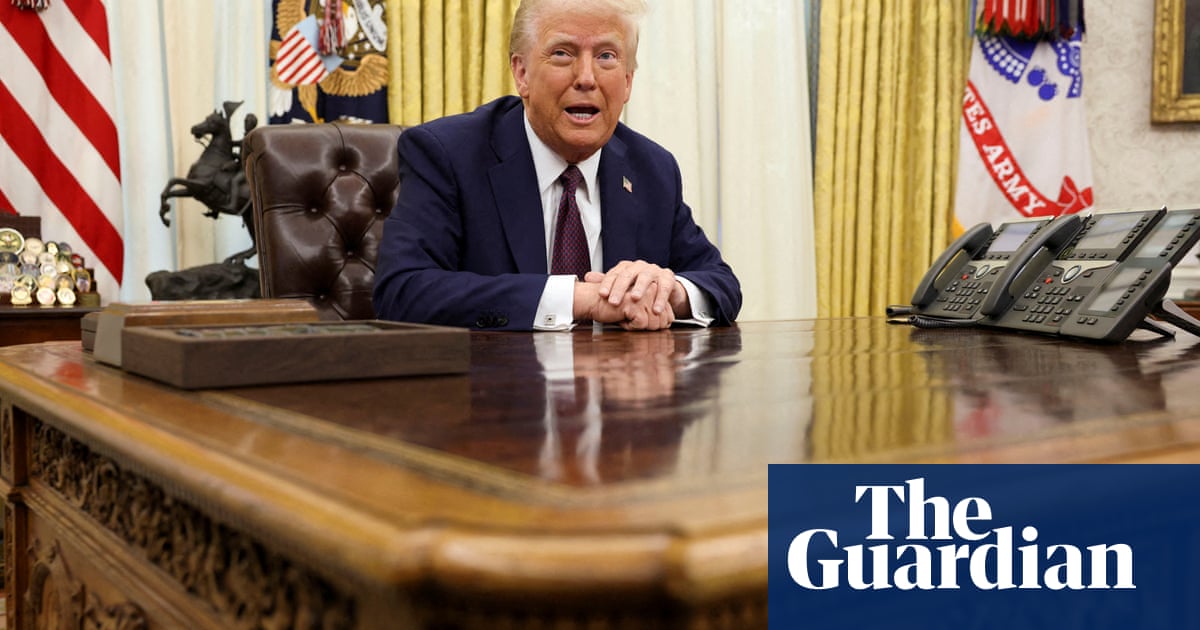An inspector general fired by President Donald Trump refused to leave her office.
General Services Administration staffers launched an encrypted chat about how to shield sensitive defense data.
A mental health specialist kept pronouns in her email signature, thinking of her transgender client.
And across the federal government, scores of workers marked emails from the Trump administration as spam - “just to piss them off,” one employee explained.
The 2.3 million civilian federal workers have found themselves on the front lines of Trump’s war against the bureaucracy, and, in ways cosmetic and substantive, some are mounting a defense.
“If I wasn’t going to use my position to speak out for what I think is right as matter of law and policy, I might as well not occupy the position at all,” said Jocelyn Samuels, a commissioner at the Equal Employment Opportunity Commission appointed by Trump in his first term and fired by Trump in his second.
For her, the line in the sand came on his first day in office, when he issued executive orders that could have prevented her from enforcing antidiscrimination laws. In the 48 hours that followed, Trump banned remote work, stripped employment protections from civil servants and ordered an end to all federal diversity, equity and inclusion initiatives. Since then, the administration’s efforts to shrink and control the government have only intensified.
For days, Samuels was one of the few who spoke publicly - Trump’s moves initially appeared to stun much of the workforce into silence. But as the administration’s efforts continued, helmed by billionaire Elon Musk, the resistance grew louder.
On Jan. 28, Trump’s Office of Personnel Management sent an email blast to the entire federal workforce offering them a way to quit and get paid through September. Musk’s staff then fanned out across government agencies, gaining access to sensitive information. By Wednesday, the American Federation of Government Employees, the largest union of federal workers, had the highest number of dues payers in its 92-year history. Four thousand people joined the union in the first five days of February, a spokesperson said, seeking protection as Musk posted to X about his crusade for efficiency, boasting of “feeding USAID into the wood chipper.”
Undergirding a fight formed in group texts and between cubicles is a conviction among nonpartisan civil servants that they provide a necessary check on Trump’s power. In interviews with The Washington Post, dozens of federal employees said their alarm was not rooted in political differences but in a desire to preserve democracy. They spoke on the condition of anonymity to avoid professional retribution but saw talking to the press at all, which violates agency policies, as an act of defiance.
Still, they wondered, with Trump in charge, would any of it matter?
“The vision they have is so outside of needing the support from any of us,” an employee for 18F, a team within the General Services Administration that helps federal agencies build and use technology, wrote in a text message to The Washington Post, “(or so they think).”
In response to the email from the Trump administration offering deferred resignation, which was titled “A Fork in the Road,” the employee made her Slack icon a spoon.
Federal workers this week protested in front of the U.S. Agency for International Development after Trump moved toward dismantling it. They converged at the Treasury Department after Musk’s deputies gained access to a sensitive system responsible for trillions of dollars in U.S. government payments. And on Wednesday, federal workers showed up at the Department of Labor, where Musk’s staffers at the U.S. DOGE Service were scheduled to meet (the meeting was held virtually).
Samuels was in bed reading a book-club book written by Ayn Rand, a Russian author who advocated for small government, when her phone pinged. It was a text from a colleague.
“Have you checked your email recently?” it said.
She walked down to her office and there it was. Sent at 10:39 p.m., one week into Trump’s presidency:
“Jocelyn,” the email began, “endeavored to impose an improper DEI agenda on America’s workplaces that is incompatible with continued public service in this administration.”
Samuels yelled so loudly that her husband, who had been asleep, ran downstairs: “What’s the matter?” he asked. She said she was so surprised she could hardly speak.
A week earlier, Samuels and two colleagues had penned a statement condemning Trump’s executive orders. She saw the directive as counter to her work as a commissioner, which capped a decades-long career doing civil rights enforcement work.
The Equal Employment Opportunity Commission, an independent agency, enforces laws that ban discrimination in hirings, firings and promotions, among other workplace issues. It is designed to be bipartisan.
The next morning, Samuels packed up framed pictures of her children and her Department of Justice seal, which was signed by her colleagues when she left that agency years prior. Then, she hired a lawyer - preparing to fight her termination, which she said was “unlawful.”
Samuels said she sometimes fears the consequences of speaking out against Trump, but added, “I hope this administration will recognize that there is a First Amendment.”
The individual acts of resistance have been joined in recent days by a barrage of lawsuits. Unions have asked a judge to stop DOGE from accessing personal information. FBI agents are suing over Trump’s plans to target agents who investigated the Jan. 6 attack at the Capitol. And on Thursday, a federal judge in Massachusetts paused the administration’s deferred resignation program, which Democrats have cast as a scam, and set a hearing for Monday.
Before the court order, federal workers had until Thursday at 11:59 Eastern time to decide to accept it. Many employees vowed to ignore the offer, seeing it as untrustworthy and a symbol of corruption. Online, fliers circulated that said, “HOLD THE LINE! DON’T RESIGN!”
By Thursday, 50,000 of the 2.3 million civilian federal workers had accepted the buyout, a source familiar with internal conversations said, speaking on the condition of anonymity to discuss information they were not authorized to share.
Meanwhile, dozens of others started to speak out in companywide meetings and in Slack channels with hundreds of people.
“You are wasting taxpayer $$ with this rehash of the 1,000 emails we received that also wasted taxpayer dollars,” one employee wrote in the chat of a Wednesday Zoom at the General Services Administration.
He was one of at least 10 employees to speak out in the public forum, according to screenshots of the meeting obtained by The Washington Post.
In a division of the agency’s Slack channel titled “#general-talk,” employees tagged Thomas Shedd, a Tesla alum recently named director of the agency’s Technology Transformation Services, and criticized him for calling return-to-office requirements an “inconvenience.”
“My family: volunteers at our church, holds positions in local government, serves on the board of a local civic organization, pays taxes in our county, cares for elderly relatives, owns our own house,” wrote one employee, according to pictures of the conversation obtained by The Washington Post. “So just know that when you say ‘inconvenience’, some hear ‘threatened with removal from our homes, harm to our families, and disruption to our local communities.’”
Shedd ultimately replied: “Inconvenience is the wrong word because it is not strong enough to explain the reality of the hard decisions that folks are tasked with making.”
He continued, “It is not my decision at this point, it is an EO [executive order] that I am tasked to inform you of and work with.”
Reached by phone, Shedd declined to comment.
At the U.S. Agency for International Development, one of the agency’s hardest hit by Trump, a Foreign Service officer planned to stop DOGE officials from entering her office, like some of her colleagues had done over the weekend. She huddled in the center of her floor on Monday with the dozens of other employees still employed in her division.
The Trump administration had fired or furloughed the rest.
“If they are coming, we’re going to barricade the entrance,” the employee said. “If you do not have a card that shows you work for USAID, you may not come onto our floor.”
They divided into four groups, one to block each of the four doors.
But then a security contractor with the division’s building directed them to stop, saying they did not have the authority to dictate who entered their floor, the worker said.
The employee and her colleagues decided to back down. They were trained to listen to authorities.
“We are government bureaucrats, we follow orders,” she explained. “Whenever a new presidential administration comes and says, ‘Do X,’ we do X. End of story.”
Related Content
New attorney general’s orders include dissolving teams focused on foreign influence
Trump, Musk wage two-front war as donor does president’s ‘dirty work’
His family gave it all to ice skating. A trip for the sport took it all away.

 German (DE)
German (DE)  English (US)
English (US)  Spanish (ES)
Spanish (ES)  French (FR)
French (FR)  Hindi (IN)
Hindi (IN)  Italian (IT)
Italian (IT)  Russian (RU)
Russian (RU) 























Comments